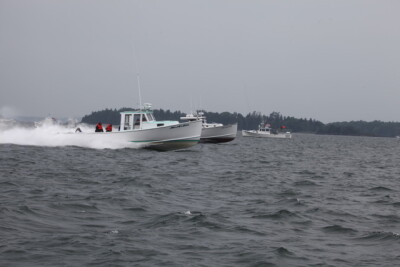On Friday, June 25, the Gulf of Mexico Fishery Management Council took final action on Amendment 53: Red Grouper Recalibration and Reallocation.
If implemented by Commerce Secretary Gina Raimondo, this amendment would reduce the commercial quota share from 76 percent to 59.3 percent, or about 600,000 pounds, starting in 2022.
“Taking 600,000 pounds of red grouper quota not only directly hurts hard-working American fishermen who rely on grouper for the businesses, but it also takes fish away from the American consumer who, through the covid-19 pandemic, proved that they are looking for more seafood and more domestic seafood,” said Bubba Cochrane, president of the Gulf of Mexico Reef Fish Shareholders’ Alliance, an industry trade group based in Galveston, Texas.
The commercial fleet unanimously opposed the reallocation in testimony to the council at the June meeting in Key West, Fla.
“Hundreds of fishermen attended public hearings and the Gulf council meeting in Key West to tell the council how taking away red grouper quota will hurt their livelihoods, their businesses, and the American consumer,” said Eric Brazer, executive director of the alliance. “This is a devastating blow to the commercial industry.”
A stamp of approval from NOAA and Commerce would also set a precedent for fisheries around the country.
“This action is devastating to the American consumer, the commercial fishermen, and enticing a new generation to the industry,” said Ed Maccini, president of the Southern Offshore Fishing Association. “Reducing allocation will put many fishermen out of business.”
The reallocation is based on new modeling made possible by Fishing Effort Surveys. NMFS has been using this method since 2018 to estimate recreational (private and charter boat) effort on the East and Gulf coasts. It replaces the outdated Coastal Household Telephone Survey, which was a landline-based survey.
The new estimates show that recreational fishing effort is three to five times higher than previous surveys indicated. The council is moving to apply those numbers retroactively (to the qualifying years of 1986-2005), claiming these long-established quota allocations should be adjusted to reflect the new data in favor of the recreational sector. However, the reallocation does not account for new investors in the fishery under the established quota system.
“I recently purchased two longline vessels and longline endorsements along with red grouper shares with a total value of over $710,000 and moved my family to Madeira Beach (Fla.) to participate in the red grouper fishery,” said Sean Heverin, president of Fish Mafia Inc. “Not only am I a boat owner and fisherman, but I also run a fish house with 15 boats that I buy and sell fish from. Many fisherman will have to tie up to the dock for parts of the year due to lack of allocation available or learn other ways to make a living. This is a big blow to my family, investment, and the fisherman and families at the dock I run.”
Commercial fishermen also testified in support of sustainable fishing, which quota allocations brought to the Gulf Coast reef fishery, along with significant attrition.
“The Gulf council just dealt a damaging blow, not just to fishermen, but to the red grouper stock,” said Glen Brooks, president of the Florida-based Gulf Fishermen’s Association. “The science shows that when more quota is shifted to the recreational sector, it means they will discard more fish. So by taking quota away from accountable commercial fishermen, more fish will be thrown overboard, dead and wasted. How is that what’s best for the fish?”
The Gulf of Mexico reef fish sector has long fought a red snapper reallocation battle, in which regional leaders sought to bring the fishery under state-based management. That effort — which would allow each Gulf Coast state to allocate more snapper to recreational fishermen — gained traction when recreational fishing effort exploded well beyond its allocation, and the sector bristled at limits to keep the harvest sustainable.
“The Gulf council has chosen to take fish away from the American public based on uncertain recreational landings that showed that sector significantly going over its harvest limits,” said Cochrane. “We’ve been down this road before with red snapper, and ultimately had allocation returned to commercial fishermen.”







